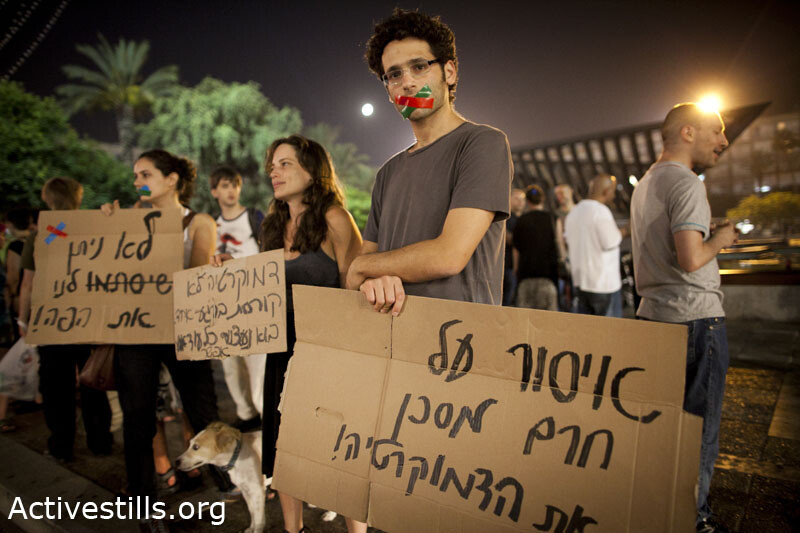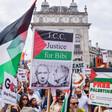Activism and BDS Beat 12 July 2011

Israeli activists protest in Tel Aviv following the passing of the “boycott law” on 11 July 2011.
ActiveStillsHuman rights groups in Israel are protesting the new Israeli law passed yesterday which “prohibits boycott of businesses, universities, and social and cultural institutions based in Israel and the illegal settlements, and imposes heavy financial sanctions against civil society organizations and businesses that participate in boycotts.”
In a press release issued today the groups — which include Adalah, Physicians for Human Rights - Israel (PHR-I), the Public Committee Against Torture in Israel and the Coalition of Women for Peace — say they intend to challenge the law at the Israeli high court. PHR-I has called for civil disobedience of the law to “defend freedom of expression.” The full text of the statement is below.
The law is the latest piece of politically-motivated legislation generating comparisons to the escalation of repressive measures during the desperate last days of apartheid in South Africa.
And as the US government attempts to criminalize Palestine solidarity, one can only come to the conclusion that by creating legislative tools to repress direct solidarity like the boycott, divestment and sanctions (BDS) movement, both the US and Israeli governments feel like the status quo of Israeli impunity is being effectively challenged.
Legislation attacking Palestinian rights
Meanwhile, as The Electronic Intifada reported earlier this year, a bill is being circulated through the Knesset (parliament) to give a settler group direct control of an archaeological site in the occupied East Jerusalem neighborhood of Silwan, which is being infiltrated by violent settlers who are occupying Palestinians’ homes.
And in March, as The Electronic Intifada reported, the Knesset passed a bill known as the “Nakba law” which requires the government to deny funding to any organization, institution or municipality which observes or commemorates the founding of the State of Israel as a day of mourning.
The Israeli Knesset has also considered a “loyalty oath” bill requiring organizations to pledge loyalty to the State of Israel as “Jewish and democratic.” The Electronic Intifada reported last December that “The legislation continues the trend of anti-democratic laws spreading throughout the country and threatens the existence of civil society organizations working for Palestinian rights within Israel.”
The full statement by the human rights groups in Israel follows:
A new law passed Monday, 11 July 2011, by Israel’s Knesset seriously harms freedom of expression and freedom of association, said leading human rights groups in Israel today. Moreover, it gives protection to the illegal West Bank settlements in Israeli law, by penalizing their opponents, they said.According to the organizations, the law will in effect oblige individuals, companies and organisations to support the illegal settlements by doing business with them. ‘The bill seeks to enforce legal protection for an illegal project,’ said Hadas Ziv of Physicians for Human Rights-Israel. ‘In other words, it signals a de jure annexation of the Israeli settlements in the West Bank.’
According to Attorney Hassan Jabareen, Director of Adalah, ‘Defining boycott as a civil wrong suggests that all Israelis have a legal responsibility to promote the economic advancement of the settlements in the OPT. This means that Israeli organisations opposing the settlements as a matter of principle are in a legal trap.’
On Monday, Israeli human rights organisations wrote an urgent letter of protest to the Israeli Ministers of Justice and Finance and to the Knesset Chair, stressing that irrespective of their own positions regarding the tactic of boycott, outlawing it severely restricts freedom of expression, by targeting non-violent public expressions of opposition to Israeli policies.
Immediately following the Knesset vote on Monday night, the organizations declared they would challenge the law in Israel’s High Court of Justice. The Board of Directors of Physicians for Human Rights-Israel issued a harsh statement against the law, undertaking to disobey it and calling on others to use civil disobedience in order to defend freedom of expression in Israel.
According to Dr. Ishai Menuhin of the Public Committee Against Torture in Israel, the law’s wording specifically targets those who promote boycott for political reasons due to their opposition to Israeli government policies and the occupation. It will harm freedom of expression through intimidation. ‘The law could lead state-funded institutions such as theatres to pressure their employees not to express their positions regarding the settlements, for fear of having their state funding withheld,’ he said.
Eilat Maoz of the Coalition of Women for Peace said, ‘This is a clear case of political persecution. The law will create an atmosphere of fear and seeks to incite the entire Israeli public against peace and human rights activists and organisations. Members of the Knesset are responsible for the further isolation of Israel as a country that intentionally violates human rights and civil liberties.’
The law will also affect freedom of association, said the organisations, since it will expose organisations engaging in public campaigning against the settlements and other human rights violations to legal and financial sanctions and costly compensations claims by settler organisations. ‘The EU and other foreign governments will no longer be able to fund human rights work in Israel if our organisations’ tax exempt status is revoked,’ they said.
The anti-boycott law
The ‘Law for Prevention of Damage to the State of Israel through Boycott – 2011,’ which was approved last night by a majority of 47 to 38 Members of Knesset, prohibits the public promotion of boycott by Israeli citizens and organisations, and, in some cases, agreement to participate in a boycott. It forbids not only a boycott of Israeli institutions but also of the illegal Israeli settlements in the Occupied Palestinian Territory (OPT).
The law defines public boycott as a new type of ‘civil wrong’ or tort. It will enable settlers or other parties targeted by boycotts to sue anyone who calls for boycott, and the court may award compensation including punitive damages, even if no actual damage is caused to the boycotted parties.
Further, the law will revoke tax exemptions and other legal rights and benefits from Israeli individuals and groups, as well as academic, cultural and scientific institutions which receive any state support, if they engage in boycott.
Israeli businesses and industries will also be penalised by the law, if they work with the Palestinian Authority and Palestinian companies and accept their conditions that exclude trade with businesses that also trade with settlements. A recent example of this is the plan to build the new Palestinian city of Rawabi. Israeli contractors wishing to participate have been asked by Palestinians to refrain from also doing business with settlements. The law seeks to penalise such contractors and may in effect deter Israeli businesses from trading with Palestinian businesses more generally.






Comments
Boycotting Israel
Permalink Tom replied on
This new law is unbelievable! I can't believe the depravity and corruption that is represented by this law. Mind-boggling is all I can say! I hope everyone who can joins in boycotting Israel and any products they produce!